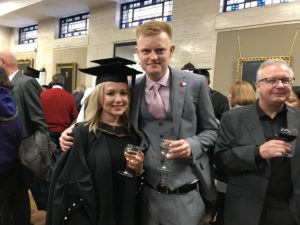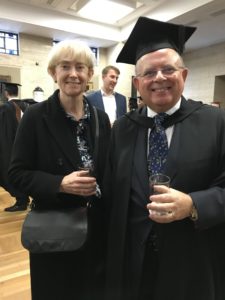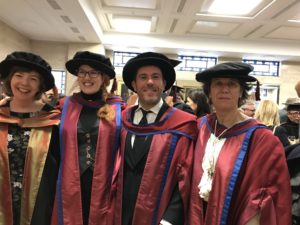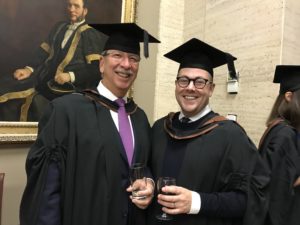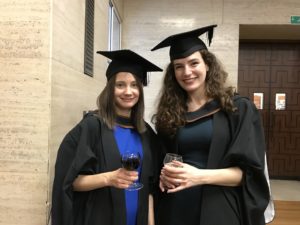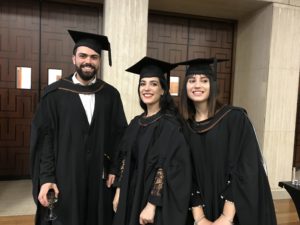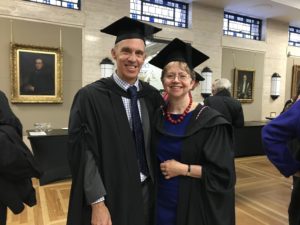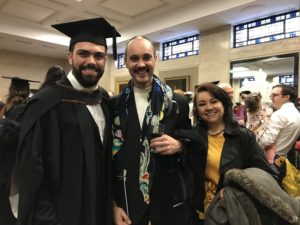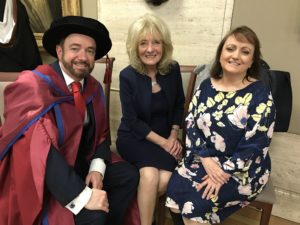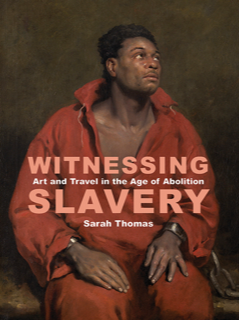Last week I got to do one of my favourite things, which was to go to graduation. For the head of department and other (un)lucky academics it does mean dressing up in extremely warm academic gowns and silly hats and sitting still for 90 minutes on the stage clapping a lot and worrying about whether you turned your mobile off. But seeing our students walk across the stage looking extremely pleased and very justifiably proud makes it worth it, and the best bit is the milling around in the reception afterwards talking to students and their families and friends. The November graduation is mostly BAs and Graduate Certificates (MAs get their chance in April), and at each one there are always also PhDs, which are really very special. Nothing like the look of relief and happiness on the face of a graduating PhD student!
Some photos of the happy graduates in question:
Reading week is now well behind us and we’re back with a vengeance. Events and opportunities galore (plus a couple of pleas). In fact… there is so much to tell you about that I’ve decided to do a two parter. Events and some news below, followed by opportunities (and pleas) in a separate post.
This evening at 6pm in Keynes Library, the Centre for Museum Cultures hosts our own Dr Kasia Murawska-Muthesius. She’ll be speaking on a topic of great art historical, museological, and political relevance as well as significant personal resonance for her in a paper entitled ‘The Critical Museum Debate Continues‘. The project of the Critical Museum – the art institution which uses its own resources, including its collection, its range of activities and its “auratic” space, for encouraging and hosting the debates on the issues that are crucial for contemporary societies – was one of the boldest and socially most significant battles undertaken by Piotr Piotrowski, when invited to run the National Museum in Warsaw in 2009 (with Kasia herself at his side as deputy director). The Critical Museum project, formed part and parcel of Piotrowski’s long-standing campaign against the prevalent discourses of contemporary art history and, in particular, against the hierarchical artistic geography, eulogising masterpieces, and marginalising the arts of East Central Europe. However, it was not just the art historical canon which was the target. Piotrowski’s museum was devised, first and foremost, as a forum, as an active agent in the public sphere, the venue for exhibiting art and discussing society, deliberately contributing to the process of defending democracy and its values, digging up difficult memories, juxtaposing conflicting narratives, empowering the disempowered, with a special attention given to the rights of minorities. The paper will discuss the origins and the premises, as well as the aftermath of the Critical Museum project. More information and booking link here (or if you don’t have time to book, just go along.)
While we’re on the topic of Museums, on Monday 18 November Sarah Thomas, lecturer in the department and director of the Centre for Museum Cultures, will be giving a lunchtime talk in the Sainsbury Wing Theatre of the National Gallery on ‘The legacies of slave ownership on art museums in Britain’. All welcome – further information and booking here. This talk follows on from a recent workshop that Sarah co-convened in September with Dr Lucy Peltz from the National Portrait Gallery (and honorary research fellow at Birkbeck). It brought together thirty museum professionals and scholars to discuss current research on the cultural legacies of slave-ownership. This was an opportunity for curators, educators and researchers from art museums across the UK to consider strategies and practical methodologies to deal with the legacies of slavery and slave-ownership, and to discuss what it might mean to ‘decolonise’ the art museum. It’s been an eventful time for Sarah, whose book, Witnessing Slavery: Art and Travel in the Age of Abolition has also recently been published by the Paul Mellon Centre and Yale University Press.
Then tomorrow (Tuesday 12 November, 5-6pm in Keynes Library) you can hear the latest research on another kind of institutional identity crisis, this one from the middle ages. For the next Murray Seminar we welcome Michael Carter, Senior Historian at English Heritage, speaking on ‘Relics and monastic identity in late medieval England’. The speaker analyses the importance of relics in the construction of monastic identities in late medieval England. He will focus on two Benedictine (Battle and Whitby) and two Cistercian (Hailes and Rievaulx) abbeys. He will demonstrate that these monasteries used relics to promote and sustain their wider religious role until the time of the Suppression, and that relics were also used to affirm relations between religious houses. Relics and the development of local liturgical observance will also be discussed. Calling upon relic lists, chronicles, heraldry, wills and extant material remains, Michael will also give an idea of the broad range of sources available for the study of the cult of relics at English monasteries, and show that significant material remains unexplored or capable of reinterpretation. The talk is a work in progress, and presents preliminary findings from a projected large-scale study into relics and monasteries in the two centuries before the Suppression. Booking link here, or just go along.
And as previously noted in this blog two more of our research centres have rich programmes of events scheduled across the rest of the term. The History and Theory of Photography Research Centre is hosting several scholars from across the pond this term, including Andrés Mario Zervigón (Rutgers, The State University of New Jersey) giving the paper ‘Fully Visible and Transparent: Zeiss Anastigmat’ on Wednesday, 20 November 2019, 6-7:30pm in Gordon Sq room 106. Then on Monday 9 December 2019, 6-7:30pm, also in room 106, Charlene Heath (Ryerson Image Centre, Toronto, Canada) will be giving a paper of equal interest to photography and museums people, ‘To Circulate and Disperse: Jo Spence, Terry Dennett and a Still Moving Archive’.
The History and Theory of Photography Research Centre is also involved in hosting the launch of a special issue of the journal Memory Studies devoted to Ottoman Transcultural Memories, co-edited by a team including our own Gabriel Koureas and Colette Wilson. The launch will be on Monday 25 November, 2-4pm in Keynes Library, and will include a short presentation on the special issue and a Q&A, and very excitingly, a musical performance by Suna Alan, one of the contributors. More information and a booking link below.
Ottoman Transcultural Memories Launch Flyer
There are also all the Architecture Space and Society Centre events coming up (Otto Koenigsberger and Global Histories of Modernism on 28 November; Apocalyptic Archives on 6 December and the English Country House on the afternoon of 12 December) – more details here and in future blogs.
Opportunities and pleas to come, as promised.


